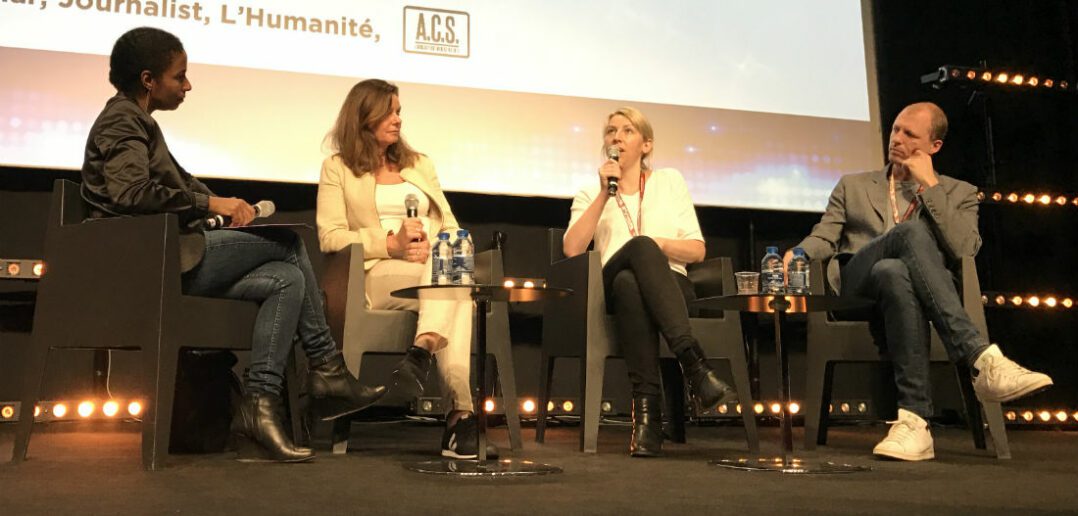There were laughs, but also some serious points made in MIPCOM’s Auditorium A this morning. That was no surprise in a session focused on how comedy can keep us entertained (and sane) in an increasingly dark world, while highlighting social issues.
The panel comprised Pernille Bech Christensen, executive producer at TV2 Danmark; Lydia Hampson, producer at Two Brothers Pictures; and Pieter Van Huyck, head of scripted at deMensen. The moderator was L’Humanité journalist Marianne Behar.
Christensen talked about the shift from Nordic noir to comedy. “We really feel like we need to push those boundaries,..We really wanted to explore comedy, or rather dramedy,” she said. TV2 Danmark has made a show called Splitting Up Together, about a couple negotiating a divorce in a country where the housing market has collapsed, forcing them to continue living in the same house. It is partly based on the experiences of its creator. “She has a saying: tragedy, if you add years to that, it can become comedy.”
Christensen said that dealing with some of the serious aspects in the drama had to be folded into humour. “It was a delicate balance…it was important that the audience felt, and could be sad with the characters. They shouldn’t just laugh, they should feel that they’re real characters.”
Hampson talked about Fleabag, a drama created by and starring Phoebe Waller-Bridge, initially as a one-woman theatre show, before transferring to a TV series. “She felt there was a sore lack of roles for strong female voices, and that the roles she was playing were foils to a male lead. So she wrote a character that was everything she wanted to play. Whether that be bawdy, rude or explicit, or really honest, or sad,” said Hampson. “It is quite explicit, but I always defend it by saying I’m not sure it’s that rude… if you look back at other UK shows like The Inbetweeners… Fleabag does the same thing. But because she’s a woman, there were lots of waves coming off that, we hadn’t seen that before.”
“I think Phoebe feels the same way as I do about it. It is a feminist statement in that it’s a strong female lead character behaving in a way that might typically be deemed a ‘male’ fashion. She has multiple sexual partners, she swears, she drinks. They’re tropes you might associate with a male sitcom lead. But I know Phoebe didn’t set out to write ‘a piece of feminist theatre’ when she wrote the play, but she was totally thrilled to be associated with the label,” continued Hampson.
Van Huyck talked about deMensen’s “romantic road movie” Tytgat Chocolate about a man with Down’s syndrome who finds a job and starts a relationship with a woman who is sent back to her homeland of Kosovo. He goes on the road trip “to find her and bring her back… It’s not a comedy show, but I guess we used comedy elements to bring some heavy subjects to a broad audience: a family audience, because this show is designed to be aired in primetime on the biggest public channel.”
“It’s about love and friendship, but of course it’s also about how people with Down’s syndrome can find their place in society, about these people who want to be treated as adults… it’s about refugees being sent back to their country. This is not easy or hyper-light, but I think the actors helped us to bring the comedy to the show. The writers never had the intention to write funny scenes or situation comedy, but these actors are not just hugely talented but brutally honest… It confronts you, but it’s also very funny too.”
The panel talked about this trend for “dramedy”. “The difficult thing was to balance it right,” said Christensen. “How do you present it to the audience so they know what they’re going to watch, especially as it was not a format that we’d done before?” Two scenes have provoked discussion in particular. One is a masturbation scene, and another which is “the spray orgasm, or whatever it’s called” – TV2 Danmark had to compromise and move the latter scene further down. “It wasn’t made for just shocking, she had very good reasons for wanting it in the show. The compromise was that it wasn’t the first scene,” she said.
Hampson said that Fleabag’s pilot episode is the funniest, but as it gets on, the show gets bleaker as the main character’s mask of “Everything’s fine! It’s fine!” begins to slip. “As we go on and the cracks start to show, she tries to push the camera away and not to let us in on what’s happening: to lose that bravado is her ultimate fallibility. Through that we managed to explore much darker topics in the show of death and betrayal,” she said.
“Fleabag is incredibly lonely and will never let you know that. It’s only at the end that you see her totally broken. But we had to use the comedy to get there, otherwise you’re just throwing bleak themes at an audience and expecting them to resonate… Tickle, tickle, punch, if you can make an audience laugh, they’ll open up to you and will be more vulnerable when you want to give them a punch.”
Behar wondered whether comedies (or dramedies) are providing a good moment for women as writers, directors and stars. “It’s such an authored piece, and having come from being a one-woman show, that truly singular voice that dictates the whole thing is a really amazing tool for anyone, and in this case it happens to be a woman. I think that’s very important: there aren’t enough female voices in television yet,” said Hampson, about Fleabag.
Van Huyck suggested that “the difference between dramedy and comedy is that you understand as a viewer what is at stake… you really care what will happen with the characters. In some comedy shows this is not the case. I think this is a good thing because it’s about the character, the story, the problems and how they try to solve their problems. And you really care… if it’s not funny for one minute, it’s no problem, because you care about the story.”
Christensen admitted that the audience for Splitting Up Together may still have been confused about the mix of comedy and drama. “We made a title sequence that was giving us the comedy notion, but we tried to communicate ‘this is both’. But we didn’t get the numbers we hoped for, and I’m sure it had something to do with that… I think it’s a wonderful show, but the audience need to get more used to it maybe. It’s different.”
Hampson said that Fleabag “started with the jokes and then really the themes that we wanted to address came through those jokes”. Those themes being loneliness, strong female friendships and the bond between Fleabag and her sister. “The challenge was maintaining the narrative arc through the stars and points of those things that had made us laugh”. She also hinted at plans for another series, after the first explored the narrative arc of the death of Fleabag’s best friend. “Because she’s an everywoman, I hope, Fleabag, the next season she’ll just wake up and start another day.”
Does dramedy travel better than comedy, in terms of global distribution? “Yes, dramedy will travel better than comedy for sure,” said Christensen. Splitting Up Together has done very well internationally, and is already being remade for the US. Hampson agreed: Fleabag was taken up by Amazon through a distribution deal with all3media. “It’s right: the emotions in dramedy are universal: it can travel easier than comedy,” agreed Van Huyck.




